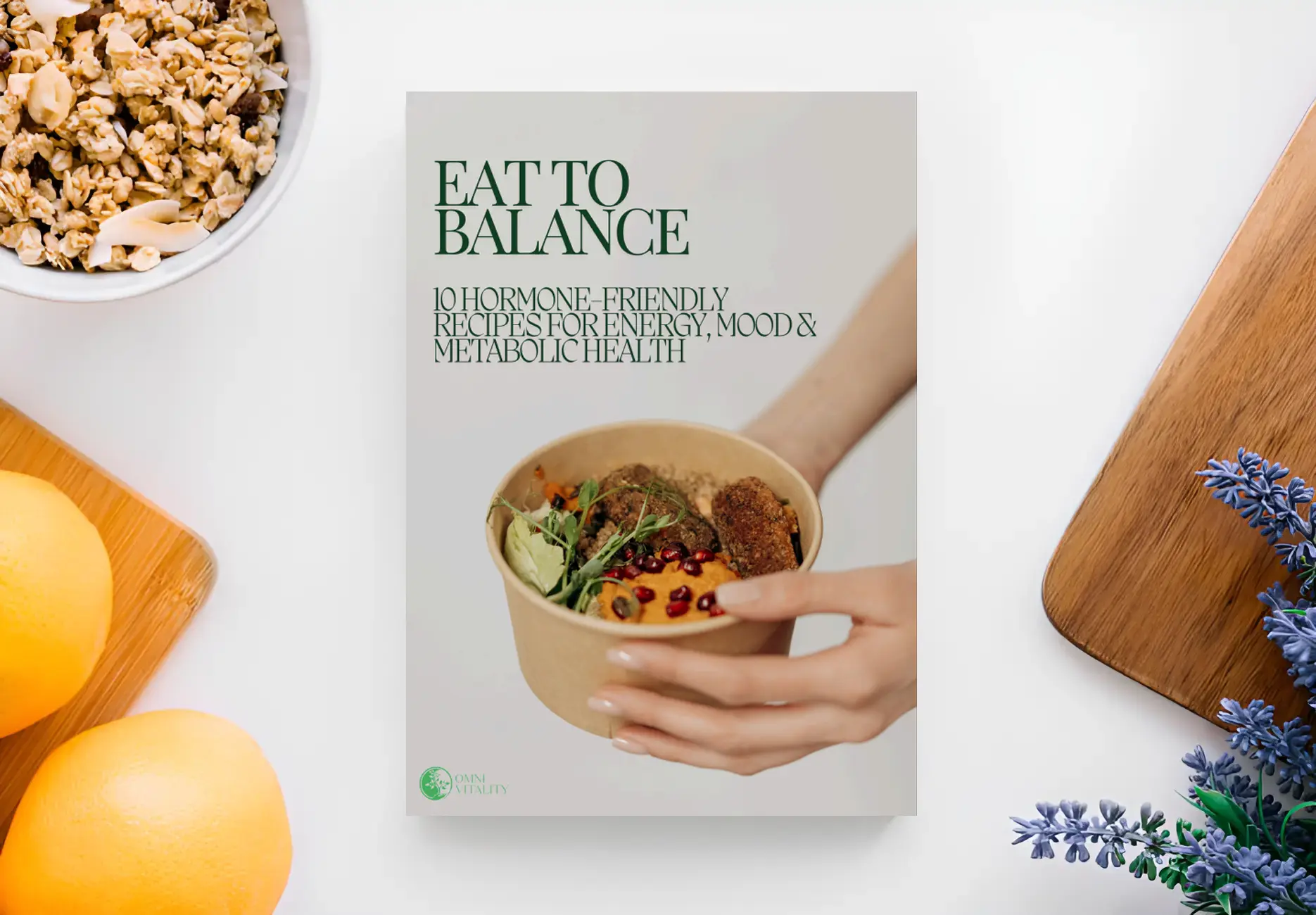Stubborn weight
While hormonal imbalance in women can manifest itself in different ways, the inability to lose weight despite their best effort comes up frequently among my clients. Many questions arise in this space:
- Why does it become harder to lose weight as we get older?
- Why do I keep gaining weight?
- What is the best way to lose stubborn belly fat?
- How to reduce fat in my hips and thighs?
- And many other weight struggles, especially after women turn forty
Let me explain. The quantity and ratio of your hormones may determine how much weight you gain and where you gain it. For example, imbalanced sex hormones may lead to the weight that sits around your thighs and hips. At the same time, the stress hormone cortisol facilitates body fat storage around the middle. The role of hormones in weight management is one of the reasons why losing weight is not just about optimising the calories-in-calories-out equation. It is about resetting the system so you stop putting calories away as fat stores and can use the fat for your energy needs. Once you restore hormonal rhythm and balance throughout your body, your weight will also return to the optimal level with minimal effort.
Best ways to lose weight for women?
Below are six steps you can take today to lose weight and take care of yourself:
- Consume adequate protein
-
Adequate quality protein consumption is key to managing weight. Protein not only keeps hunger at bay but is also one of the critical building blocks for many messengers in the body. Meat, chicken, seafood, and eggs are excellent sources of protein to include with every meal. Tempeh, beans and lentils, nuts and seeds, and tofu are great protein sources if you are vegetarian.
- Cut back on sugar and simple carbs
-
Limiting sweets and refined carbohydrates helps stabilise blood sugar and lower the need for the hormone insulin, curbing our appetite and helping us use stored fat for energy needs.
- Eat healthy fats
-
Fats from olive oil, avocado, nut and seeds, and oily fish are the building materials for many hormones. Healthy fats are also crucial for our cells' health, allowing them to communicate effectively (i.e., respond to hormonal messages). On the other hand, vegetable oils (like sunflower oil) and trans fats found in packaged foods can wreak havoc on our cells' health, so eliminate these from your diet to support your hormonal health.
- Prioritise sleep
-
Quality sleep is essential if you want to lose weight. One night of disrupted sleep can cause havoc with our blood sugar, making us crave unhealthy food and hold on to excess energy more efficiently. Get seven to eight hours of sleep to help you manage weight. What is the first step you can take today to improve your sleep? Go to bed an hour earlier, and don't take your phone or other electronic devices to your bedroom.
- Manage stress
-
While we can't permanently eliminate stressors in our life, it is essential to remember that it is not the stressful situation itself but our perception of it that matters. Practising yoga and meditation, taking a few minutes to do a breathing exercise, or simply going for a walk in the park can make a big difference in how the body responds to stress and help eliminate the cravings for sweets and snacks.
- Engage in appropriate levels of exercise
-
One does not have to run a marathon, or run at all, to introduce exercise into one's life. To benefit from physical activity, we can simply walk regularly, as even a near-daily brisk walk can do wonders for our hormonal balance. Try going for a short walk after meals; it will make a big difference to how your body uses and puts away the energy from the food you eat.
One more common question for women concerned with weight loss is, 'why do I retain so much water?'.
Water retention may have several underlying causes:
- Fluctuations in sex hormone levels could lead to the body holding on to more water and salt, which causes body cells to swell up, leading to the feeling of bloating or puffiness.
- Excess oestrogen levels can lead to the body retaining more water.
- The hormone progesterone, which is high in the latter half of your cycle, can slow down digestion, leading to feelings of bloating or fullness.
- Give your liver some love
-
If our bodies cannot clear used hormones effectively, this can contribute to hormonal imbalances, which, among other things, may contribute to water retention. The liver plays a significant role in removing used-up hormones from the body. Support it by adding quality protein, cruciferous vegetables, onions, garlic, ginger, herbs & spices to every meal. Reducing alcohol intake and managing stress will further help by reducing the load on the liver, freeing up the capacity to detoxify other substances.
- Fibre and water
-
Drink 2 litres of clean water every day and eat adequate fibre. Once the liver has packaged the used-up hormones, our gut is responsible for removing these from the body. Making sure we poop daily is key to this. Fibre and water are crucial to supporting daily bowel movements.
- Regular exercises
-
Can help disperse the liquid in the body and support our detoxification functions, helping us remove used-up hormones and other toxic substances from the body.
- Diuretic food
-
Asparagus, grapes, and cucumbers are just some foods known for their diuretic effect.
- Dandelion leaf
-
If you retain water or feel puffy before your period, dandelion leaf can help you naturally expel the excess water. Add it to salads and soups, or make tea from its flowers.
Problem with mood
Do these feelings sound familiar to you?
- Are you prone to mood swings?
- Are you an emotional mess?
- Are you groggy and irritable?
- Are you seeing red all the time?
- Do you have an anxious knot in your stomach?
For years, I believed feeling overwhelmed with emotions as my period approached was normal. I never really understood what those emotional swings meant. I thought it was part of being a woman. I thought I just had to "ride out the storm". I now know that just because your hormones fluctuate during the month doesn't mean you have to be an emotional mess.
Many women of reproductive age experience such emotional premenstrual symptoms as depression, irritability, mood swings, anxiety, hopelessness, and apathy. You don't have to live like this.
Try the simple changes below to support your mental health.
- Cut back on sugar and simple carbs
-
These foods promote inflammation in the body and the brain, contributing to many physical and emotional symptoms. Instead, add herbs and spices to your diet, such as rosemary and turmeric, known for their anti-inflammatory effect.
- Move your body
-
Exercise can do wonders not just for your body but also for your mental health. Moderate exercise, which can be as simple as a brisk daily walk, can lower inflammation and improve brain function.
- Eliminate inflammatory foods
-
Try to eliminate gluten, dairy, caffeine, alcohol, and inflammatory fats (fats found in processed or refined foods, fast foods, margarine, and vegetable oils) to reduce the load the body has to deal with, freeing up the capacity for renewal and repair.
- Sleep
-
Getting seven to eight hours of quality sleep at night gives our body and brain time to recover.
- Brain-supporting fats
-
Eat oily fish like salmon, mackerel, and sardines at least three times a week. These fats contain vital structural components for our brain cells and can also help lower inflammation.
- Banish stress
-
Excess stress hormones are damaging to our brain cells. Introducing stress management practices like meditation, breathing, or simply taking a relaxing bath in the evening can help protect your mental and emotional health.
- Eat a rainbow
-
Ensure you eat a variety of vegetables with every meal. Veggies are a nutrient powerhouse and can help protect the cells from daily insults.
Gut health
Constipation, diarrhoea, bloating. These gut discomforts are too familiar for many of us.
While there can be many reasons behind the gut symptoms, a hormone shift can also play a role by changing your bowel habits. More than 30% of menstruating women suffer from abdominal bloating in the run-up to their period. The hormone progesterone, which rises in the second half of your cycle, can play a role in this. Progesterone can slow digestion, contributing to bloating, fullness, or even constipation. And when the levels of this hormone drop just as your menstruation starts, this can decrease the transit time; in other words, it makes you poop more.
Take these steps today to support your gut health:
- Anti-inflammatory diet
-
Remove processed foods, sugar, alcohol, caffeine, and gluten from your diet. Instead, show your gut some love by eating various vegetables, berries, lean protein, and healthy fats.
- Mindful eating
-
Take a minute to anticipate your meals and enjoy the smell and look of your food. Eat slowly and mindfully. Try to eat at the table without devices (phone, TV, etc.). These simple steps will prepare your body to digest the food and absorb the nutrients from your meal.
- Stress management
-
Work on practices to help you manage stress, especially before meals. When we are stressed, our body prioritises addressing stress over digestion. Sitting down for a few minutes of belly breathing before you eat your food can make a big difference in preparing your gut for the meal.
Problem with sleep and enegy
Are you tired all the time? Do you have an afternoon energy crash when you want to reach for coffee and chocolate? Do you struggle to fall asleep or wake up frequently at night? Do you wake up feeling fatigued even after sleeping for ten hours?
Some common factors that may be associated with fatigue and disrupted sleep may include the following:
- Blood sugar imbalances
- Low iron levels
- Reduced levels of chemical messengers like serotonin
- Inflammation
- Nutrient deficiencies
Here are my top tips to combat fatigue and improve sleep:
- Banish sugary foods
-
Abrupt hormonal changes, such as when their levels surge and collapse, greatly impact our energy level and sleep quality. Sugary foods are at the heart of the hormonal rollercoaster. To prevent energy crashes, eat less sugary foods, replacing them with quality protein and healthy fats which sustain energy for longer.
- Add more plant foods
-
Vegetables, nuts, seeds, and whole grains are excellent sources of fibre, which can help sustain the energy release from your meals, keeping you energised for longer.
- Quality sleep
-
Go to sleep and wake up at the same time every day, which helps fine-tune your circadian rhythm. Start a bedtime routine (such as taking a bath or reading a book) to prepare your body for sleep. Drop the temperature of your bedroom, which may help you fall asleep faster and have a more restful night.
- Iron-rich foods
-
Menstruating women can lose a lot of iron due to monthly blood losses. Healthy iron levels are essential for sustained energy. Red meat (especially organ meats) and leafy greens (if you are vegetarian) are excellent sources of iron. Combine iron-rich foods with fruit and vegetables containing vitamin C (e.g. citrus fruit and greens) to aid absorption. Do not drink caffeinated drinks too close to meal times, as these can hinder iron absorption.
- Manage your stress
-
As we have seen, stress hormones disrupt many processes in the body and are often at the heart of hormonal imbalances. Try different stress management techniques to understand which works best for you. Some examples to experiment with are meditation, journaling and breathing exercises.


























